Test cricket is the oldest and the longest format of the game. It means that for the average cricket buff, it can get boring at times to sit on the television screen and wait for the result of the match for a period of five days. But Test matches can be extremely exciting as well, producing nail biting and stunning finishes which prove that this format is likely to remain immortal even if T20 cricket is the trend of the game at the moment.
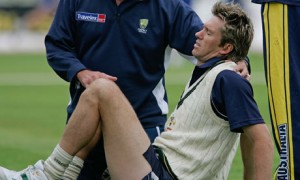
There have been fabulous Test matches over the years such as India’s famous comeback at the Eden Gardens in Kolkata against the world champions Australia in 2001 as well as Pakistan’s famous win over India in Chennai in 1999, where Sachin Tendulkar made 136 but was dismissed in the dying stages of the game due to cramps. But the match which qualifies the best to be considered the greatest Test match ever is the 2005 Ashes Test match between England and Australia at Edgbaston, Birmingham. It had all the moments of drama, tension, relief, joy and sorrow making it a complete package of a match for the cricket fan to watch again and again over the years.
If Birmingham produced the greatest ODI match ever, it also produced the greatest Test match ever. How lucky far are in that city to watch such matches in front of their eyes! Coming back to the 2005 Ashes, Australia were 1-0 up in the series after crushing England at Lords by 239 runs. They obviously had that psychological advantage heading into the second Test at Edgbaston, while one more mistake for England and their wait for the Ashes would have extended for more than 19 years. Nothing was going right for the home team until the morning of the match, when something terrible happened for Australia.
Glenn McGrath, their legendary bowling spearhead and the man who wrecked England’s batting line up at Lords, stepped on one of the Kookaburra balls during practice as he was chatting with Brad Haddin. Suddenly, he injured his ankle and had to be taken off on the stretcher. His unavailability caught the No.1 team in the world off guard, and a far less lethal Michael Kasprowicz replaced him in the team. Australia’s bowling attack looked vulnerable within a span of an hour and the moment England got to know about this, they sensed that this was their best chance of fighting back into the series which they could not have wasted.
All the England players had their hearts in their mouths when Ricky Ponting won the toss but all of a sudden were taken by surprise when he won the toss and decided that Australia will field first. Even if it was slightly overcast, it was a belter of a pitch and it bought a wry smile on England captain Michael Vaughan’s face. Everybody seemed shocked but perhaps this could have been Australia’s way of saying that so what if we don’t have McGrath, we can still win without him. However, England might not have agreed with this theory and their plan was clearly to bat Australia out of the match.
Marcus Trescothick and Andrew Strauss had become a marvelous opening pair for England since the last 12 months and this was the ideal stage to prove why. A pace attack comprising of Brett Lee, Jason Gillespie and Michael Kasprowicz were hammered to all parts of the ground as Trescothick was very quick in his scoring while Strauss was a bit slow but at the same time converting the strike well. With the 100 run partnership coming in no time, this did not seem to be the England team which was thrashed at Lords. The fans had something to cheer about at the ground.
It was until Shane Warne came on to bowl, as it has always been over the years that when he is given the ball by his captain, he picks up a wicket almost immediately. And he did so for the umpteenth time in his career, as Strauss narrowly missed out his fifty. Warne’s presence was after all so important for the side that he had to lead the bowling attack alone in the absence of his partner in crime, McGrath.
Vaughan came in at No.3 and put on 52 for the second wicket with Trescothick. Australia again were on the back foot until Kasprowicz proved why he was a decent replacement for McGrath. Trescothick was dismissed off his one ball which was an out-swinger for the score of 90, which was an outstanding knock because Australia were not used to opposition batsmen being aggressive towards their bowling. This set the right platform for England to get a big score.
But a couple of balls later and Kasprowicz was at it again, as Ian Bell was given out for 6 and all of a sudden Australia were back in the hunt. Vaughan did not survive for long either and was the fourth wicket for the visitors as Gillespie opened his wicket tally finally in the game. England were in a tricky position at 187/4 after 37 overs only. There were two new batsmen at the crease, Kevin Pietersen and Andrew Flintoff whom with their attacking style of batting soaked up the pressure extremely well.
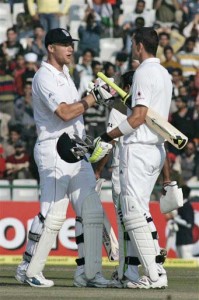
The manner in which the likes of Brett Lee and Shane Warne were decimated was a joy to watch for any cricket fan except an Australian one! This was the beginning of a great series for Flintoff with not only the ball but with the bat as well as he finished with a 68-ball 62 which made England fight till the end of the innings. Whereas for Pietersen, this was his third half century on the trot in his first three innings of Test cricket and was the making of a fantastic career ahead. He contributed 71 runs but the home team still needed the help of the tail-enders to make them reach a total of 407 all out at the end of the first day’s play itself. Shane Warne may have ended with 4 wickets but none of the bowlers were impressive enough.
When it was Australia’s turn to come out to bat in the first innings, there was a feeling that a result could be enforced by either team. England scored at above 5 runs per over, and on a single day, this was their highest score since the Second World War. Australia had the time to get past the hosts’ 407 on what was still an excellent pitch to bat on. But the home team could not have asked for a better start as the burly Matthew Hayden was dismissed off the first ball by his namesake Matthew Hoggard and that got the Aussie skipper, Ricky Ponting at the crease.
Justin Langer and Ricky Ponting attacked in the same fashion in which Strauss and Trescothick did at the beginning of the innings. Both of them were threatening to take the game away from England until the man who was the subject of severe criticism, Ashley Giles struck gold with the wicket of Ponting. Batting on 61, he played an inexplicable sweep off the left arm spinner only to give a catch to his counterpart Vaughan. Followed by which Damien Martyn tried to score runs at a quick pace, until Vaughan was in the action again and scored a direct hit to inflict his run out.
But Langer was still going strong and he put up a 76 run partnership with Michael Clarke, until Giles struck again and proving that the Aussies could be troubled with his spin. Simon Katich did not survive for long, as Andrew Flintoff continued troubling left handed batsmen in the series. Another southpaw, Adam Gilchrist joined Langer and this was the last of the good partnerships for Australia until Langer was given out lbw to Simon Jones, who was having a quiet game till that point. And so from 282/6, the visitors collapsed to 308 all out handing over England a critical first innings lead of 99 runs.
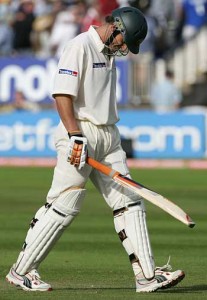
England could have shut out Australia completely since there were still three days remaining for this Test match to finish. But Australia are always a dangerous opposition because of their ability to come back strongly from dire situations and this is why they dominated world cricket for close to 15 years. Lee and Warne, who were hammered in the first innings, were the only two bowlers to have picked up wickets throughout the second innings. With this, Lee proved why he should be a regular in the Test side as well while Warne finished with 10 wickets in the match.
Strauss was yet again dismissed by Warne, and that too bowled for just 6 runs. A flurry of wickets was to follow as Trescothick, Vaughan and the night watchman Hoggard fell to the lethal pace of Brett Lee. This was the fiery spell which reduced England to 31/4 at one stage, with the lead being a paltry 130. Ian Bell and Kevin Pietersen tried their best to resurrect the innings but Bell struggled to play Warne, let alone getting the better of him. Finally, Warne had the last laugh by getting Bell out in the way he used to get South Africa’s Daryl Cullinan out. But just before this wicket, he also got rid of Pietersen.
At 75/6, it was looking all grim for England until Andrew Flintoff decided to take on the Australian bowling singlehandedly. He batted very cleverly to ensure that he got most of the strike, as this time the last four batsmen could only add 29 runs to the final team total. Flintoff was characteristically brutal if even there was the danger that the team would get all out while he was stranded at the crease. Such a courageous knock was needed for England to boost their morale again as they finished with 182 all out, with Flintoff being Warne’s sixth wicket of the innings and tenth wicket of the match.
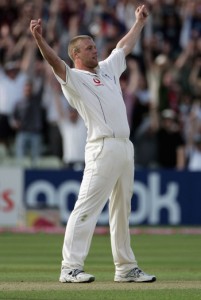
England finally had something to defend, even as Australia had all the time in the world to get 282 runs to win the match. The wicket still looked as fresh as a daisy to make the batsmen calm. Langer and Hayden began sedately, which frustrated England badly. But this prompted Vaughan to perform a masterstroke, by bringing his trump card and the top scorer of the second innings, Flintoff onto bowl. And he bowled what is till date the best over any fast bowler would dream of bowling in a Test match.
This was a brilliant over not only because he troubled the batsmen with his immaculate and specific line and length alongside his pace, but also because he got the wicket of Justin Langer off only his second ball which was almost unplayable. That was not all! He then made Ricky Ponting sweat for five deliveries by probing him continuously outside off stump, until on the last ball of the over, he decided to go for an expansive drive but only managed to find the outside edge of his bat and the wicketkeeper took a regulation catch. To get a world class batsman like Ponting out in that fashion proved that cricket was a bowler’s game as well after all. Langer was also a batsman of high calibre and it is almost impossible for any bowler to get both of them out in the same over, unless they make silly mistakes.
Michael Clarke was the batsman who survived the most till the end of the third day’s play while the others took the long walk back to the pavilion. Flintoff picked Gillespie for a duck, while Hoggard picked Martyn for 28. Giles continued his brilliant game with another two wickets and that too the crucial ones of Katich and Gilchrist. Steve Harmison capped off a magnificent day for England by getting Clarke bowled at the end of the day, to leave the world champs reeling at 175/8.
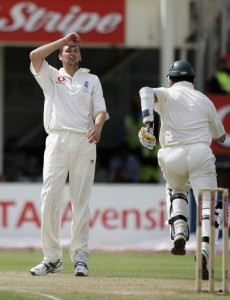
Vaughan must have already foreseen his team celebrating an outright win by lunch time on the fourth day and many England fans took it granted that Australia was already beaten. Yet, it was good to see a jam packed crowd for the fourth day’s play as Shane Warne and Brett Lee, the destroyers in chief of England’s second innings, came out to bat. And both of them made a significant batting partnership as well.
England were shockingly lackluster in their bowling but due credit also has to be given to these two for making the hosts work hard to achieve their victory. Warne proved that he was no mut with the bat and made 42 runs, until he was unfortunately hit wicket off the bowling of Flintoff, who picked up his fourth wicket of the innings. It was 220/9 and Michael Kasprowicz was the last man in. England were just 1 ball away from a glorious win while Australia still needed 62 to pull off what was then to be a spectacular run chase. Anyone would have still thought England were the favourites!
But it was not to be as Lee continued with his fighting effort while Kasprowicz was proving to be a more than capable partner for Lee as per the situation. Simon Jones dropped a relatively simple catch at third man off Harmison’s bowling when Kasprowicz was batting, and that was as good as dropping the Ashes since Australia by then, got very close to the target. Yet, Vaughan persisted with Harmison, his right hand man to do it for the side.
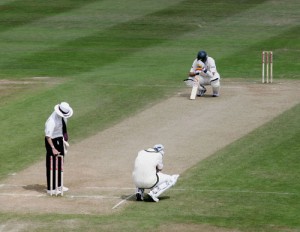
In what was one last effort since the Aussies needed 3 runs to win, Harmison bowled a bouncer to Kasprowicz knowing that it was a huge risk. He would have been more nervous than everybody else because he had to bowl the winning ball. The ball apparently deflected off the No.11’s gloves and the keeper Geraint Jones completed the catch of his life although it is a simple one because it came straight into his gloves. Billy Bowden raised the crooked finger, and the euphoria began of England winning an Ashes Test on the verge of an embarrassing defeat.
The stadium was as electric as the Eden Gardens in Kolkata when India wins any match and scenes such as Andrew Flintoff lifting Michael Vaughan in the air and the distraught and shocked pair of Lee and Kasprowicz not leaving the pitch for a while. But the most memorable scene from this match was when Flintoff took time out and actually consoled Lee who was actually crying because he fought till the very end, and batted extremely well even if he was a bowler. This was perhaps the greatest act of sportsmanship a cricketer can ever commit and it was a lesson to learn especially for youngsters.

England had basically won hearts with this 2 run victory and dramatically leveled the series, 1-1. While Australia may have missed McGrath to a certain extent, they proved why they were the No.1 team in the world with their fighting abilities coming to the fore. All was not over for either of the sides, as the last three matches were to be thrilling contests and finally England had an opportunity to win the Ashes back from their archrivals after 19 years which they actually did.

Leave a Reply